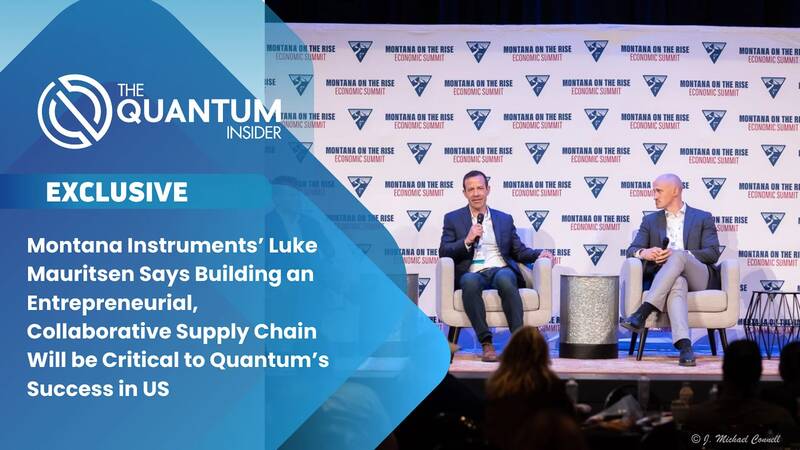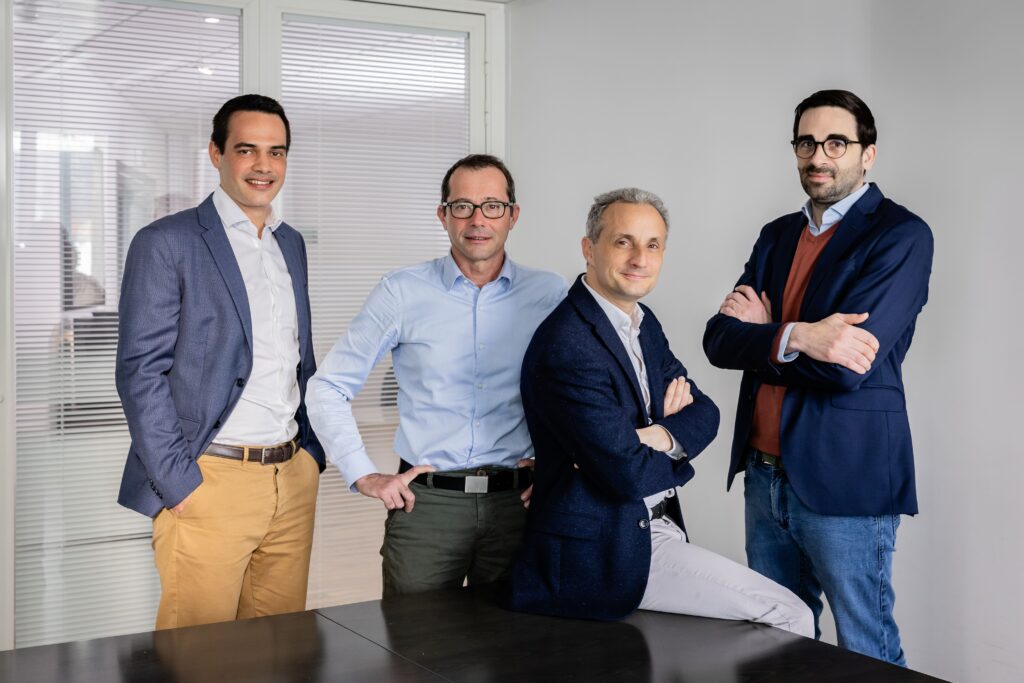Quantum technology is obviously complex. The supply chain that will support and expand the quantum ecosystem will also be complex, but is key to nurturing and even accelerating progress in quantum tech, according to a pioneer in the development of that emerging quantum ecosystem.
Luke Mauritsen, founder of Montana Instruments, “the premier cryogenics company accelerating quantum discovery,” was an early leader – and evangelist – in the potential of quantum technology. He has served in several pioneering organizations with missions to begin the process of developing the quantum ecosystem in the United States.
To build a thriving quantum industry, Mauritsen said that the US will need revolutionary growth in companies that can create the supply chain for quantum computers along with a sprawling logistical ecosystem that will encompass everything from hardware to software, peripheral equipment to advances in cryogenics, photonics, electronics and even basic materials.
“If you look at that supply chain, I’m confident in saying that nearly every aspect – the materials, the hardware, the software, basically all the parts and pieces that you need to make a quantum computer – will need to be reinvented or significantly evolved over the next five to 10 years. Many of the companies that will need to be part of this supply chain don’t exist yet. Some will need to be created and some will make that pivot to quantum, but I think the fundamental thing that needs to happen right now is to foster an entrepreneurial environment within that supply chain so that it can be created.”

The recent history of the United States’ semiconductor industry casts a shadow on this vision for a robust quantum supply chain. Recent disruptions to the semiconductor industry have ravaged multiple industries, caused havoc in consumer markets, and sparked national security concerns. This disruption, suggests Mauritsen, points to the need for strong, domestic supply chains in general, and in the nascent quantum computing industry specifically.
Mauritsen identified the need for secure quantum supply chains immediately after being among the small group of quantum experts to meet at the White House before the signing of the U.S.’s National Quantum Initiative, which set the stage for a national push into creating quantum technology. Montana Instruments was one of the organizations invited to the event in 2018 to support the bill, which later passed through a largely bipartisan vote. The bill mandated the establishment of the Quantum Economic Development Consortium, or QEDC, a consortium among the government, academia, and primarily led by industry.
“Early in that evolution, during the first few QEDC meetings, there was a point when I realized that the US doesn’t have any strategic plan for cryogenics,” said Mauritsen. “There’s no strategic plan for cryogenics in quantum. Looking around that room, I thought that somebody here should do that. I mean, that’s our job. That’s when I spoke up and said that I think we should build the first roadmap for the US for cryogenics in quantum.”
Mauritsen said that 55 quantum experts were invited to Bozeman, Montana near the company’s headquarters.
“With those 55 experts, we built a roadmap for cryogenics in quantum that is in use by both industry and government today,” said Mauritsen, who continues to serve on an advisory committee called the National Quantum Initiative Advisory Committee (NQIAC).
The NQIAC is just one of the ways Mauritsen’s advocacy for the supply chain is guiding the development of quantum supply chain technology in the US.
“I was nominated and appointed to that committee because I believe in the importance of supply chain to the US, of addressing the supply chain, and also building out the supply chain for the quantum industry right now,” said Mauritsen.
Building an entrepreneur-driven quantum supply chain will be no easy task, said Mauritsen. It will require each part of what eventually will become the quantum industry seamlessly working in concert – from researchers on the cutting edge of science, to government bodies committed to removing barriers to progress, to entrepreneurs building businesses that will fall into the right slots of this massively complex supply chain.
Despite the challenges, Mauritsen believes the US has the natural strengths to accomplish this feat. The country has deep entrepreneurial roots – and a spirit of coaching and mentorship by those who have had previous success.
“I think it may be overlooked, but one thing so fundamental to the American dream is that we have a culture in America that when a person has success, he or she often wants to go back and help more people have success and do what he or she did,” said Mauritsen. “That sets up an ecosystem of support, of mentorship, of coaching and investing. That’s part of my story. I have had tremendous mentors. My story is not the story of ‘Oh, I had this great vision and I did it all myself.’ I had incredible mentors and some early seed investment. I’ve had people walk with me through every stage of the business and help me all the way.”
MonArk Quantum Foundry
MonArk, another project Montana instruments is partnering in, is an example of how building collaborations across public and private sectors can start to chisel out that quantum supply chain ecosystem.
The MonArk Quantum Foundry, led by Montana State University and the University of Arkansas, will create basic materials and tools to accelerate the development of quantum materials and devices. The foundry received a $20 million grant from the National Science Foundation in September 2021.
“I think this is an amazing opportunity for the state of Montana,” said Mauritsen. “This is the second funded quantum foundry in the US and it’s in the early stages. It will be a university entity, but very industry-facing.”
One objective for MonArk is to set up the nation’s first incubator testbed for early-stage testing development on quantum components. Because the testing of many of the components that need to go into a quantum computer haven’t been developed, the failure modes of those components don’t exist yet. Major developers do not have the bandwidth to tackle this problem right now, either.
“There’s no real business case for it yet,” said Mauritsen. “However, because the quantities of components are not well understood it’s a really great place for something that’s positioned more in academia, but still be industry-facing. So, this will be the nation’s first testbed for early-stage development of components. What we hope to do, in collaboration QED-C companies is help develop the first test protocols and the beginning of standards for these components, but mainly, the standards for the testing will begin here.”
Montana Instruments and Quantum Leadership
Mauritsen said the company’s position as both a pioneer and a leader in the quantum space evolved from its connection to the scientific community. He said that by keeping track of how customers were using Montana Instruments’ equipment, the team had realized the growing importance – and potential – of quantum technology.
A shift occurred in the middle of the decade, “around 2015 to 2016,” said Mauritsen, “when our company began to notice an increase in quantum materials research among Montana Instruments’ customers.”
“At some point in our conversations and investigations,” Mauritsen continued, “we realized about 90% of our customers were developing quantum materials and that started to shape the company’s quantum trajectory.”
The quantum computing industry was also quickly evolving around the same time, he added, and Montana Instruments is proud that its products played a role in that emergence.
“The quantum industry was starting to get some traction,” Mauritsen said. “There were people developing the first small-scale computing systems. Our customers were starting to spin out into venture-funded companies to build a quantum computer. We saw that from the beginning. Systems that we made in 2013 ended up being the beginning of some fantastic entrepreneurial startups in the quantum industry.”
Cryogenics is a central part of the quantum computing supply chain. Quantum computers exploit the quantum properties of atoms, ions and superconducting circuits and operate at extremely low temperatures to isolate from environmental noise.
Montana Instruments’ initial goal was to make cryogenics easier.
“We created the first product in the cryogenics industry that you could just set on a table and start using,” said Mauritsen. “You didn’t have to understand cryogenics or be trained in cryogen flow or anything like that. You could set it up and be ready for your first experiment.”
The ease-of-use and proven vibration isolation were fundamental principles not addressed by companies operating in the cryogenics industry at the time.
“Ultimately, the customers were coming back to me and they would say, ‘Thank you. You are helping to accelerate our discovery in materials,’ for example, which made me feel good and made me feel we were on the right track.”
You can learn more about Montana Instruments and their new interactive product viewer at montanaisntruments.com.
For more market insights, check out our latest quantum computing news here.

















